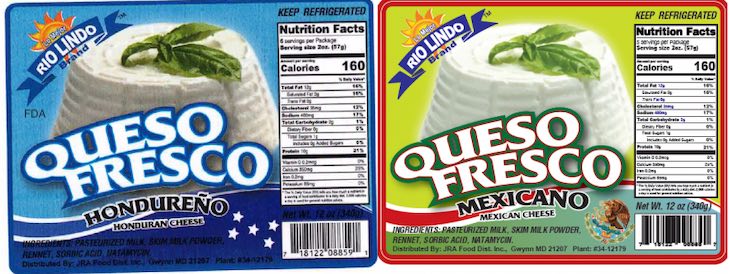After a Listeria outbreak linked to El Abuelito queso fresco ended two pregnancies and left one person dead, the company is no longer making ready-to-eat cheese, a spokesperson from the U.S. Food and Drug Administration (FDA) confirmed to Food Poisoning Bulletin today.
El Abuelito first halted production and distribution of its cheese on February 19, 2021, after genetic tests showed the Listeria strain found in queso fresco made by El Abuelito and purchased by one of the people who became ill matched the strain cultured from outbreak patients.
Before the outbreak, El Abuelito made queso fresco and other soft, fresh cheeses sold under the brand names El Abuelito, Rio Lindo, Rio Grande, Viejito, El Paisano, El Sabrosito, La Cima, Quesos Finos, San Carlos, and Ideal. These cheeses were sold at retail stores in 26 states. Consumers who see these products for sale in stores or online should not purchase them.
Along with the New Jersey Department of Health, the FDA will continue to monitor El Abuelito’s operations, the FDA spokesperson said. “We have not issued a close-out letter for the June 2020 warning letter, meaning that the violations in the warning letter have not yet been resolved to the FDA’s satisfaction.”

Food Safety Violations
The warning letter stems from a January 2020 inspection of EL Abuelito’s facility on Main Street in Paterson, NJ. During the inspection, FDA investigators found food safety violations including non-pathogenic Listeria species indicating an environment conducive to the growth of Listeria monocytogenes which can cause serious illness and death.
They also discovered the company didn’t have a hazard analysis for each type of food it manufactures, established preventative controls for bacteria and other hazards, a written food safety plan and that it wasn’t testing the facility for Listeria, which is considered a “known or reasonably foreseeable hazard for cheese.”
FDA told El Abuelito to correct these issues, but on a follow-up inspection found the company’s efforts had fallen short. So, in June 2020, the FDA issued a warning letter. Four months later, the first patient in this outbreak fell ill.

El Abuelito Listeria Outbreak
Last week, the Centers for Disease Control and Prevention (CDC) declared an end to the four-state outbreak that sickened 13 people between October 20, 2020, and March 17, 2021. Twelve of these patients, which included a prematurely delivered newborn and a 75-year-old, were hospitalized. One person died and just one of the four pregnant women sickened in this outbreak was able to carry her pregnancy to term.
In general, pregnant women are 10 times more likely than the general population to contract listeriosis. Hispanic pregnant women are 24 times more likely. “Much more needs to be done to warn pregnant women of this dangerous pathogen,” said Food Poisoning Bulletin Publisher and noted food safety attorney Fred Pritzker. “As this outbreak showed, the risk Listeria poses to pregnant women couldn’t be higher.”
Among pregnant women, Listeria can cause miscarriage, stillbirth, and the premature delivery of an infected newborn, even if the expectant mother experiences only mild illness. Twelve of the 13 people sickened in this outbreak were Hispanic. Four of them were pregnant women. Two women lost their pregnancies, another delivered an infected newborn prematurely.
El Abuelito issued a queso fresco recall on February 19, 2021 and an expansion of the cheese recall on February 27, 2021. These recalls, posted on the FDA’s website, have images and more product information that can help consumers identify ready-to-eat cheeses made by El Abuelito. These products should no longer be on the market and should not be purchased and eaten if they are. The company does, however, continue to produce meat products at another location.




